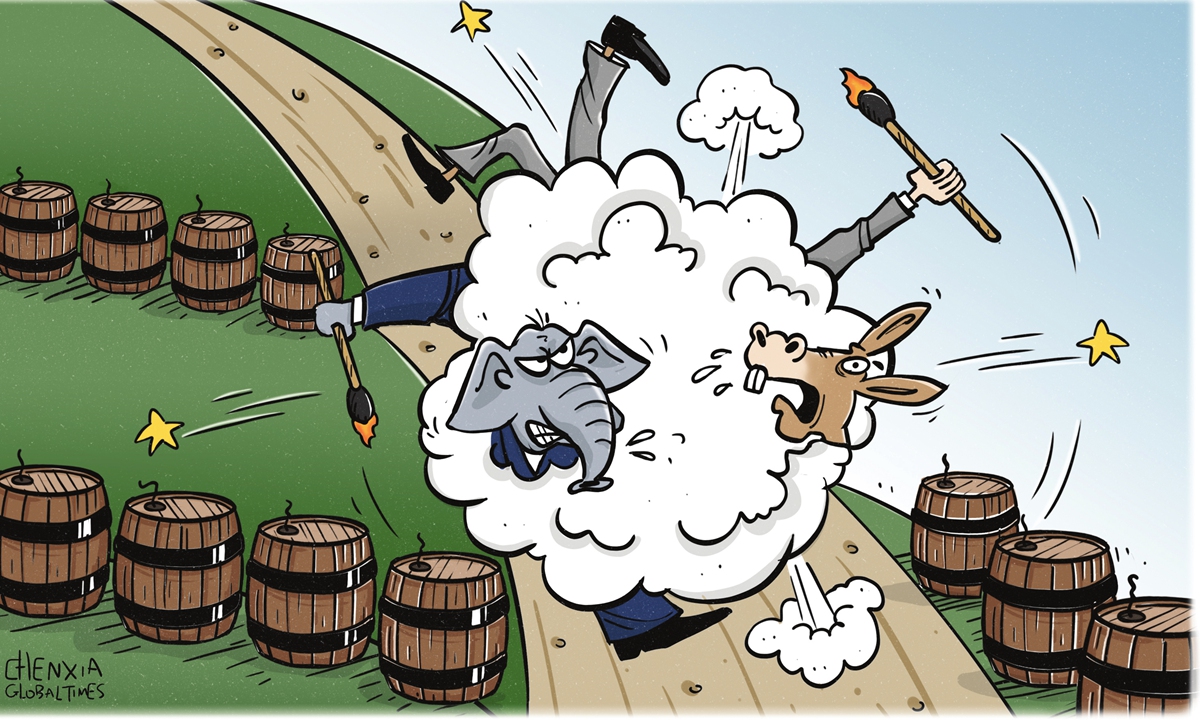
Illustration: Chen Xia/Global Times
The US has shaken itself and the world in recent months. US House Speaker Nancy Pelosi's potential visit to Taiwan island has significantly escalated tensions between China and the US. In June, the Supreme Court eliminated the constitutional right to an abortion. The enraged public immediately took to the streets, sparking a storm of protests around the US. In a rare move, not only did UN Human Rights officials, but also the leaders of US allies Britain, France, New Zealand and Canada criticized the ruling.
From the perspective of political science, both incidents are very puzzling. The US is facing external challenges including the Russia-Ukraine conflict and instable relations with China under China-US strategic competition and has to deal with internal woes such as a new wave of COVID-19 resurgence, high inflation and the risk of recession. It is indeed in a situation whereby "a spark can ignite a fire." In such a context, US elites should focus on dealing with these unprecedented challenges and crises regardless of their positions and try to put out the fire, instead of adding fuel to it. They need to do something to give the country a chance to breathe and develop.
However, under the separation of powers, the Supreme Court and the House of Representatives are doing the opposite thing.
Pelosi is 82 years old. Considering the possibility that Democrats may lose the midterm elections, she will likely no longer serve as the speaker of the House of Representatives and retire from the stage of history. So why did she choose to make such a rash and reckless move?
The Russia-Ukraine conflict has lasted for five months, and the contest of strength and will power between the two sides has reached a critical moment. The bitter consequences of the war are also being comprehensively presented. Apart from high prices and a slowing economy in Europe and the US, other developing countries are confronting a basic survival crisis. Sri Lanka, which declared the country bankrupt, was the first one in this context. Is Pelosi attempting to shift attention from Russia when she chooses this moment to provoke China's core interests?
From the perspective of institutional structure, the US is one of the few countries that implement the separation of powers. The judicial and legislative branches will not consider the overall situation, let alone have an international perspective. This can be said to be a problem in the genes of institutional design.
Yet the system is just a framework in any country, and there are many conditions for it to function well. Among them, the most important is that social elites must have consensus on major principles. Otherwise, countries will fail to function well, and their institution itself will collapse. The US today is in its most divided domestic condition since the Civil War, and Americans cannot compromise with each other. This split is not only the traditional rivalry between the ruling party and the opposition counterpart, but also taking place within parties. Take the transition of power between administrations as the core of the US system. When the 2020 presidential election results came out, then US president Donald Trump refused to accept the election results, did not participate in the handover ceremony and even incited his supporters to occupy the Capitol Hill. But there are also many within the Republican Party who publicly disagree with Trump. Former Republican presidents George H. W. Bush, and his son George W. Bush, did not vote for Trump in 2016.
Although its system can still accommodate different classes, it cannot address the contradictions amongst them, or even those within the same class. That's why we see one astonishing incident after another in which the US harms itself, or jeopardizes others without benefiting itself. This is just the beginning, however, and events and historic setbacks in the US that are beyond the global imagination will be seen in the future.
The author is a research fellow at the China Institute, Fudan University. opinion@globaltimes.com.cn




